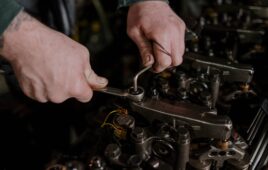Written by Dr. Jody Muelaner

Screws provide convenient disassembly and reassembly while rivets provide economical and reliable fastening.
The choice of using threaded fasteners, such as machine screws, or rivets depends on many factor and is complicated by the wide range of fasteners available.
The advantages of machine screws and bolts are easy disassembly and reassembly, the ability to reuse the fastener, and the availability of such fastening tools. Some advantages of rivets include resistance to vibration, low-profile heads, and the rapid, low-cost assembly where large numbers of fasteners are required.
For typical workshop applications, where pop rivets are usually used, threaded fasteners will provide superior strength. Pop rivets use a hollow shaft, reducing their ability to resist shear loads. The strength of the materials used also depends on the power of riveting tools available.
Light-duty riveting tools are only able to upset aluminum rivets, which provide low-strength fastening. Heavy-duty pop rivet tools can install higher strength fasteners, such as stainless steel, but their strength is still limited by the requirement for a hollow shaft. A benefit of the hollow shafts and softer metals used for pop rivets is that it makes removal relatively easy. A drill bit can be easily seated in the hollow end and used to remove the head.
By contrast, solid rivets are perhaps the strongest mechanical fastener available. They are available in high-strength steels and aerospace alloys, and their solid shaft is able to transmit the greatest possible shear force for a given hole size. This is higher even than possible for a threaded fastener since threads create potential crack initiation sites. Furthermore, once the heads of a solid rivet are formed the fastener is almost completely immune from vibration.
For these reasons solid rivets continue to be the preferred fastener for critical applications such as aircraft structures and steel bridges. The disadvantages of using solid rivets are that highly specialized and costly installation equipment must be used which requires good access from both sides of the assembly. Additionally, they are difficult to remove.
Machine screws and bolts offer an extremely useful combination of high strength, compatibility with a range of commonly available tools and easy disassembly and reassembly with fastener reuse. The disadvantage of relatively poor resistance to vibration is addressed well by a range of vibration resistant and locking nuts as well as thread lock.





Appreciate the technical advice on when to use rivets & why. Thanks
John